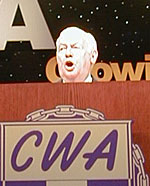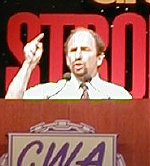AFL-CIO chief tries to restore unions' political muscle
By Patty Marsicano, Minnesota Public Radio
July 10, 2001
The national convention of the Communications Workers of America wrapped up Tuesday in Minneapolis. The union's 2,300 delegates heard AFL-CIO President John Sweeney and others talk up the importance of expanding union membership.
THE CWA REPRESENTS MORE THAN TELEPHONE WORKERS nowadays. It also includes food-service workers, nurses, law-enforcement officers and more. With 725,000 members - including 9,000 in Minnesota - the CWA says it must get bigger to fight political assaults on workers' legal protections and what union officials call corporate greed.
AFL-CIO President John Sweeney told the delegates they're in a time of "great peril and great potential," pointing to the attacks on workers' rights laws in Congress and the diminishing wages of many working families. But he says there is hope in the numbers of unorganized workers who want to join unions. "As union leaders and union activists, it is our job to reach out for our members with one hand and for those non-union workers with the other hand and bring them together for a bigger, stronger, movement for social justice," Sweeney said.
Sweeney says the job is all the more crucial because AFL-CIO member unions represent just 13 million people, the same number as in 1956.
Outgoing Minnesota AFL-CIO President Bernard Brommer told the crowd that recruiting new members was essential if workers were to have a voice in corporate decisions to dissuade companies from trade and investment policies that hurt workers.
"We want a global economy that works for working families and we demand seats at the table where the rules of that economy are made. We won't get there, sisters and brothers, without a fight and to win that fight we've got to be organized. That's where it all begins and ends - organizing," Brommer said.
The CWA highlighted the importance it places on expanded membership by awarding union organizers who'd brought in more than 7,000 new members in the last year. Union officers at CWA Local 7201 in St. Paul say they're joining the drive to bring in new members.
"We are looking at organizing what used to be Media One. They have a sales center in St. Paul that we're looking at and hopefully we can get it going before long," delegate Randy Munsterman explained.
But union activists acknowledge the organizing doesn't prevent companies from consolidating or closing down work sites.
Phyllis Weathers, president of CWA Local 7213 in Owatonna is a Qwest Communications operator. She says a group of union workers at Qwest will lose their jobs next month when the company moves their division from Owatonna to White Bear Lake. "I have 54 members that will be losing their jobs and do not have a whole lot of other options. Most of them will probably be on the unemployment line," she said.
Other union delegates said union representation is still important because it dramatically improves their working conditions while employed.
The convention proceedings had a highly political flavor. Union delegates bristled at the Bush presidency when speakers pointed out what they called its anti-union initiatives, but applauded the Democrats' takeover of the Senate.
They cheered loudly when Minnesota Sen. Paul Wellstone vowed to fight any rollbacks in workers' rights in his new capacity as the chair of a subcommittee with oversight over several national labor laws.
Delegates also passed a resolution opposing the Free Trade Agreement of the Americas, which would expand the North American Free Trade Agreement - NAFTA - to virtually the entire western hemisphere. Union activists say the agreement contains no protections for workers, the environment, children's rights, or human rights.
By Patty Marsicano, Minnesota Public Radio
July 10, 2001
|
|
RealAudio |
The national convention of the Communications Workers of America wrapped up Tuesday in Minneapolis. The union's 2,300 delegates heard AFL-CIO President John Sweeney and others talk up the importance of expanding union membership.
| |
|
|
|
||
AFL-CIO President John Sweeney told the delegates they're in a time of "great peril and great potential," pointing to the attacks on workers' rights laws in Congress and the diminishing wages of many working families. But he says there is hope in the numbers of unorganized workers who want to join unions. "As union leaders and union activists, it is our job to reach out for our members with one hand and for those non-union workers with the other hand and bring them together for a bigger, stronger, movement for social justice," Sweeney said.
Sweeney says the job is all the more crucial because AFL-CIO member unions represent just 13 million people, the same number as in 1956.
Outgoing Minnesota AFL-CIO President Bernard Brommer told the crowd that recruiting new members was essential if workers were to have a voice in corporate decisions to dissuade companies from trade and investment policies that hurt workers.
"We want a global economy that works for working families and we demand seats at the table where the rules of that economy are made. We won't get there, sisters and brothers, without a fight and to win that fight we've got to be organized. That's where it all begins and ends - organizing," Brommer said.
The CWA highlighted the importance it places on expanded membership by awarding union organizers who'd brought in more than 7,000 new members in the last year. Union officers at CWA Local 7201 in St. Paul say they're joining the drive to bring in new members.
| |
|
|
|
||
But union activists acknowledge the organizing doesn't prevent companies from consolidating or closing down work sites.
Phyllis Weathers, president of CWA Local 7213 in Owatonna is a Qwest Communications operator. She says a group of union workers at Qwest will lose their jobs next month when the company moves their division from Owatonna to White Bear Lake. "I have 54 members that will be losing their jobs and do not have a whole lot of other options. Most of them will probably be on the unemployment line," she said.
Other union delegates said union representation is still important because it dramatically improves their working conditions while employed.
The convention proceedings had a highly political flavor. Union delegates bristled at the Bush presidency when speakers pointed out what they called its anti-union initiatives, but applauded the Democrats' takeover of the Senate.
They cheered loudly when Minnesota Sen. Paul Wellstone vowed to fight any rollbacks in workers' rights in his new capacity as the chair of a subcommittee with oversight over several national labor laws.
Delegates also passed a resolution opposing the Free Trade Agreement of the Americas, which would expand the North American Free Trade Agreement - NAFTA - to virtually the entire western hemisphere. Union activists say the agreement contains no protections for workers, the environment, children's rights, or human rights.


